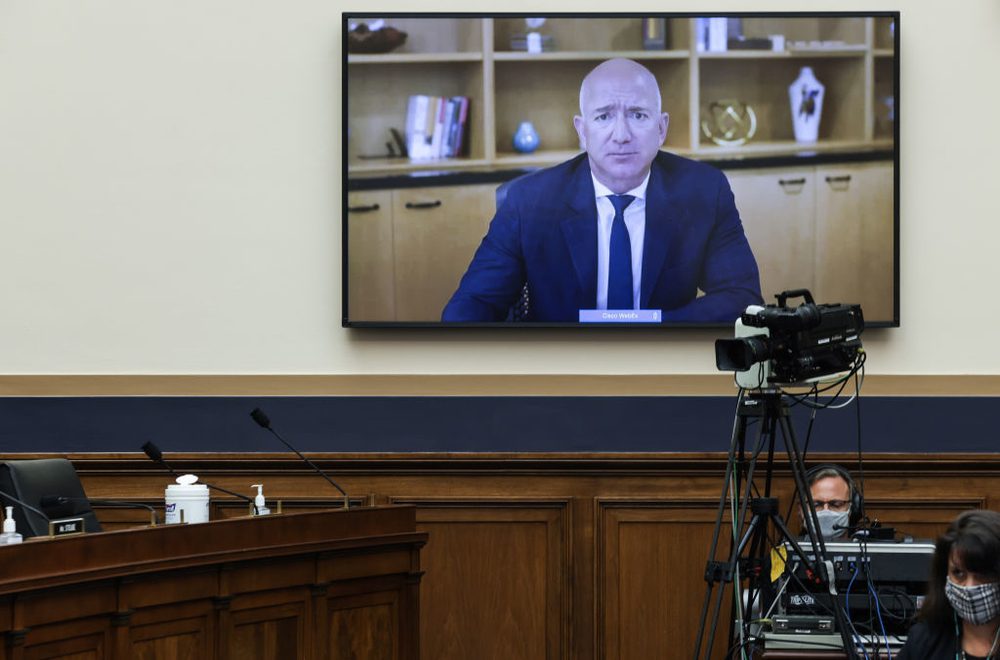Don’t Break Up Big Tech, Fix It

The titans of the big-tech industry: Mark Zuckerberg, Jeff Bezos, Tim Cook, and Sundar Pichai testified in front of the House Subcommittee on Anti-Trust on Wednesday. The event had drawn intense anticipation as a potential turning point of the conversation on tech, timely, as in the midst of the COVID-19 pandemic in which American small-businesses have faltered under the pressure of lock-downs and detrimental losses of revenue, big-tech’s profits have continued to skyrocket. Legislators on the sub-committee had spent a year’s worth of investigation and a review into millions of documents; assessing the legality of these big-tech corporations and their potential anti-competitive practices.
Republicans and Democrats had different priorities to address. Namely, the Democrats pressed the titans of industry for their anti-competitive practices that appear to be hurting small businesses, whereas Republicans favored questioning about political censorship and the power that big-tech has to censor in the online marketplace of ideas.
Big-tech leaders refuted allegations of their anti-competitive practices, instead, citing competitors in the marketplace, downplaying their power in the market, and highlighting the improvements they’ve made to services they’ve taken over that have positive benefit to the consumer. The tech CEOs argued that they also compete with more traditional industries outside the online marketplace. Instead of having a consolidation of industry, Zuckerberg argued that buying companies allowed big tech to compete and create a service that is ultimately better for the consumer: “When Google bought YouTube, they could compete against the dominant player in video, which was the cable industry. When Amazon bought Whole Foods, they could compete against Kroger’s and Walmart. When Facebook bought WhatsApp, we could compete against telcos who used to charge 25 cents a text message, but not anymore,” he said.
Despite concerns over Chinese involvement, the CEOs portrayed themselves and their companies as being the embodiment of Americanism—rags to riches entrepreneurial stories that are only possible in the U.S. due to its freedom. Big tech also posed a stark divide to lawmakers, that the Chinese economy is continuing to both grow and innovate at a rapid pace, and it is essential to support U.S. businesses rather than allow them to falter and restrict them. “Of the 10 most valuable companies a decade ago,” Zuckerberg said, “only three still make that list today. And if you look at where the top technology company has come from, a decade ago the vast majority were American. Today, almost half are Chinese.”
Ranking member Sensenbrenner (R-WI), largely agreed with their sentiments, arguing that ‘big’ is not necessarily bad. “It seems me that it’s not for Congress, that legislates, to toss all of our antitrust laws in the precedent that has been established through litigation over the last hundred plus years,” he said. The subcommittee failed to make a convincing argument for the reform of anti-trust laws or the breaking up of big-tech, as many political pundits may have expected. It also shows a stark divide in the GOP, as figures such as Sen. Josh Hawley—who has gained political clout for his attacks on big-tech, even going as far to suggest the overhauling of the FTC.
Republicans pushed on the notion of anti-conservative bias on their platforms.
Ranking member Sensenbrenner even went as far as accusing Facebook CEO Mark Zuckerberg of censoring Donald Trump Jr., though his ban was on an entirely separate platform, Twitter. “Congressmen, well first to be clear,” Zuckerberg replied, “I think what you might be referring to happened on Twitter. So it’s hard for me to speak to that.”
Some Republicans pressed Google CEO Pichai for their connections to China, notably Rep. Gaetz, who criticized Google for their work in establishing an AI center in China —in which Silicon Valley conservative Peter Thiel, who serves on Facebook’s board, had accused Google of acting in a “seemingly treasonous” way as their work in AI may benefit the Chinese military and the development of new weapons. Google had also ended their contract with the Pentagon on Project Maven, a top AI development project, to which Pichai in his letter addressing Google’s cancellation that, “We believe that Google should not be in the business of war.”
Pichai defended Google’s Chinese operations, saying, “we have clarified what we do and what we do in China compared to our peers. It’s very, very limited in nature. Our AI work in China is limited to a handful of people working on open source projects.” He added that Google’s presence in China is minuscule due to censorship laws that prevent the usage of search, maps, Gmail, YouTube, and others.
One major line in the sand was drawn, as all CEOs except Zuckerberg refuted the question proposed by Rep. Steube about whether or not the Chinese government has stolen information from their company. Cook, Pichai, and Bezos all stated that they had no first-hand knowledge of the Chinese stealing information. Zuckerberg, by contrast, said, “Congressman, I think it’s well documented that the Chinese government steals technology from American companies.” Secretary of State Mike Pompeo lambasted the big-tech leaders after the hearing for their refusal to address this strategic concern, “The idea that anyone in the tech space could not know of what the Chinese Communist Party is attempting to steal and the cyberattacks they are making seems incredulous to me.”
At the conclusion of the hearing, it was clear; more investigation into the relationship between big-tech and China is needed, especially as Chinese espionage over data and information continues to be uncovered at alarming rates. Collaboration with big-tech and lawmakers should be more frequent in order to protect American data.